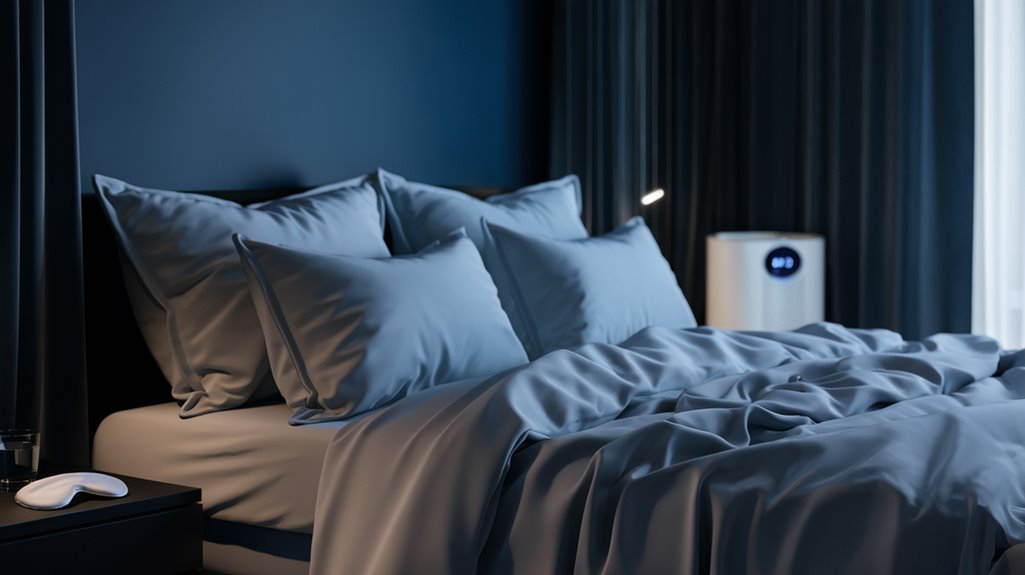Learn the science-backed sleeping habits that can reduce belly fat and transform your body while you rest.

To sleep your way to a flatter stomach, you'll need to optimize both sleep quality and nighttime habits. Research shows poor sleep increases daily calorie intake by 300-385 calories and redirects fat storage to your belly. Plan your final meal 4-5 hours before bed, practice gentle evening stretches like Legs Up the Wall, and maintain a cool bedroom temperature between 65-68°F. Understanding these science-backed strategies will help you transform your body while you rest.
While many people focus solely on diet and exercise to reduce belly fat, the science reveals that sleep plays a crucial role in fat distribution and metabolism. Research shows that insufficient sleep can increase your daily calorie intake by 300-385 calories, primarily from high-fat and sugary foods. You're also 35% more likely to gain weight when you don't get quality sleep.
What's particularly concerning is how sleep deprivation affects where your body stores fat. When you're not getting enough rest, your body redirects fat storage to the visceral compartment – the dangerous inner belly fat that surrounds your organs. Studies demonstrate that restricted sleep can lead to an 11% increase in visceral fat, a change that isn't easily reversed by catch-up sleep. According to research from Mayo Clinic, participants experienced a 9% increase in abdominal fat after just a few weeks of sleep restriction. This visceral fat accumulation greatly raises your risk of metabolic and cardiovascular diseases. Your body's ability to burn fat efficiently becomes compromised, creating a cycle that's difficult to break without proper sleep habits.

Setting up a strategic evening food schedule is fundamental to achieving a flatter stomach during sleep. You'll need to carefully time your meals and choose foods that minimize bloating and water retention. Focus on fresh, low-sodium ingredients while avoiding processed foods, cruciferous vegetables, and high-FODMAP items that can cause digestive discomfort overnight. Taking a walk after dinner can help stimulate digestion and promote better overnight results.
Your evening meal strategy should prioritize lean proteins, fresh produce, and proper portion control. Don't eat within two hours of bedtime, as this can interfere with digestion and lead to unnecessary bloating while you sleep.
Choosing the right pre-bedtime snacks can considerably reduce bloating and promote a flatter stomach while you sleep. Focus on foods rich in potassium and probiotics to maintain healthy fluid balance and support gut health.
You'll find excellent debloating properties in berries, bananas, and kiwis. Berries contain polyphenols that alleviate IBS symptoms, while bananas help prevent water retention. Kiwi's actinidin enzyme accelerates digestion, making it an ideal nighttime choice. Adding fresh ginger root to herbal tea can help soothe digestive distress and speed up stomach emptying before bed.
For protein-rich options, consider Greek yogurt paired with fresh fruits or a small portion of eggs. These choices provide sustained nutrition without causing digestive distress. If you're craving something more substantial, try banana and almond butter on multigrain bread or homemade nice cream using frozen fruits.
Remember to avoid high-sodium foods, sugar-free gum containing sorbitol, and dried fruits before bed, as these can trigger bloating and disrupt your digestive system during sleep.

To achieve a flatter stomach during sleep, establishing essential evening relaxation practices proves crucial for reducing cortisol levels and minimizing stress-induced bloating. By incorporating diaphragmatic breathing and progressive muscle relaxation techniques, you'll activate your parasympathetic nervous system, which aids digestion and reduces abdominal tension. The 4-7-8 breathing technique can be particularly effective for calming the nervous system before bed.
Transform your bedroom into a sleep sanctuary by maintaining a cool temperature between 65-68°F and eliminating electronic devices. These environmental adjustments support your body's natural circadian rhythm and optimize overnight digestive processes.
While late-day exercise offers unique benefits for strength and power activities, strategic timing proves essential for maintaining both workout effectiveness and quality sleep. You'll want to complete your workouts at least 2-3 hours before bedtime to prevent sleep disruptions caused by elevated heart rate and body temperature. Evening fatigue may affect your motivation and energy levels for nighttime workouts.
For evening exercise, focus on lower-intensity activities like yoga, stretching, or light resistance training. If you're committed to nighttime workouts, you can still achieve performance gains, as research shows strength and power outputs can be 3-15% higher during evening sessions. However, avoid high-intensity cardio close to bedtime.
To optimize your evening workout routine, incorporate gentle cool-down exercises and follow with relaxation practices like meditation or light stretching. Consider taking a warm shower afterward to help lower your body temperature. This approach allows you to benefit from evening exercise while maintaining healthy sleep patterns essential for achieving a flatter stomach.

Strategic beverage choices before bedtime can greatly impact your body's fat-burning potential and sleep quality. For ideal results, select drinks that enhance metabolism while promoting restful sleep. Herbal options like chamomile and peppermint tea support digestion and reduce bloating, while ginger-cinnamon combinations boost thermogenesis during rest. Research shows that holistic fat loss works best when combining smart beverage choices with proper diet and exercise habits.
Remember to avoid sugary drinks, alcohol, or excessive caffeine before bed, as these can interfere with both sleep quality and your body's natural fat-burning processes.

You'll find significant benefits in practicing gentle inversions like legs-up-the-wall pose before bed, as these positions help reduce fluid retention and promote lymphatic drainage. The cat-cow flow sequence specifically targets your core while calming your nervous system and preparing your body for sleep. Incorporating bedtime digestive stretches, such as the seated spinal twist and knee-to-chest pose, can help relieve bloating and optimize your metabolism during sleep. A consistent nighttime yoga routine helps achieve a toned abdomen through regular mindful movement.
Gentle inversions before bedtime can greatly enhance your sleep quality while promoting a flatter stomach through improved circulation and digestion. These restorative poses activate your parasympathetic nervous system, reducing cortisol levels that contribute to belly fat accumulation. Legs Up the Wall pose particularly helps drain excess fluid and reduces bloating. Millions of people struggle with sleep issues that can affect metabolism and weight management.
For best results, maintain a consistent 10-20 minute practice, focusing on deep breathing throughout each pose. Use props as needed to guarantee comfort and proper alignment, allowing your body to fully relax into each position.
The Cat-Cow flow sequence offers a dynamic approach to achieving both a restful night's sleep and a flatter stomach through mindful movement and breath coordination. This gentle practice activates your digestive system while calming your nervous system, creating favorable conditions for rest and metabolism.
As you flow between poses, you'll massage your internal organs and stimulate your Solar Plexus Chakra, enhancing digestive function and metabolic processes. The synchronized breathing pattern encourages complete diaphragmatic engagement, which helps reduce bloating and promotes abdominal strength. You'll also release tension in your back and neck while improving spinal flexibility, essential for maintaining proper posture throughout the night. The practice activates the parasympathetic system, helping your body transition naturally into a state of deep relaxation.
Practice this sequence consistently before bed, and you'll likely notice improvements in both sleep quality and core awareness.
While preparing for a night of restorative sleep, strategic bedtime stretches can optimize both digestion and core muscle engagement. By incorporating specific poses one hour after dinner, you'll enhance blood flow to your abdominal region and support your body's natural digestive processes. The legs up the wall position promotes blood circulation and relaxation for up to 10 minutes.
Start with gentle movements like the Half-Wind-Relieving Pose to massage your abdomen, followed by Vajrasana to stimulate circulation. Finish with a Reclined Twist to release tension in your lower abdominal muscles.
These evidence-based stretches will support your digestive system while preparing your body for restful sleep.

Creating an ideal sleep environment plays an essential role in achieving quality rest and supporting your body's natural fat-burning processes.
Keep your bedroom temperature between 68-77 degrees Fahrenheit, as cooler temperatures promote better sleep and metabolic function. Maintain humidity levels at 30-50% using a hygrometer to monitor conditions and prevent breathing issues that could disturb your rest. Install blackout curtains to block disruptive light, and avoid blue light from electronic devices before bed, as they interfere with melatonin production.
Combat unwanted noise with white noise machines or earplugs, since excess noise can increase stress hormones and reduce sleep quality. Invest in a supportive mattress and temperature-regulating bedding to prevent discomfort from disrupting your sleep cycles. Paint your bedroom walls in calming colors like blue or green to create a peaceful atmosphere. Following these environmental optimizations will help maximize your body's overnight recovery and fat-burning potential.

You'll optimize your body's fat-burning potential during sleep by establishing a systematic nightly ritual that combines pre-bed stretching sequences with targeted digestion-boosting techniques. Your evening routine should include gentle exercises like planks and leg raises, followed by relaxation poses such as "legs up the wall" to enhance circulation and promote proper digestion. Supporting these activities with sleep-friendly food choices, such as avoiding heavy meals within three hours of bedtime and staying hydrated with magnesium-rich water, will maximize your overnight belly-flattening results.
Before heading to bed, a targeted stretching sequence can optimize your digestion and support a flatter stomach through the night. Start with Cat-Cow poses to increase circulation and properly align your digestive organs, performing 8-10 repetitions with mindful breathing. Follow with Legs Up the Wall for at least 5 minutes, allowing gravity to naturally reposition your internal organs while promoting relaxation.
Combine these movements with deep, intentional breathing to maximize their digestive benefits and prepare your body for restorative sleep.
To optimize digestion and promote a flatter stomach overnight, establishing a strategic evening routine focused on digestive health is essential. You'll need to coordinate your eating schedule, incorporate specific foods and herbs, and maintain proper positioning to maximize digestive efficiency.
| Strategy | Implementation |
|---|---|
| Meal Timing | Eat dinner earlier; avoid large meals before bed |
| Digestive Aids | Take probiotics; drink ginger or chamomile tea |
| Position | Sleep on left side; avoid lying down post-meals |
| Stress Management | Practice deep breathing; engage in gentle yoga |
| Natural Support | Sip magnesium water; use peppermint or fennel |
Building on your evening digestion routine, selecting the right foods before bedtime plays a pivotal role in achieving a flatter stomach while sleeping. Choose protein-rich snacks like cottage cheese with fruit or Greek yogurt, which contain tryptophan and promote satiety throughout the night. You'll also benefit from incorporating melatonin-rich foods such as pistachios or tart cherries to enhance sleep quality while maintaining your weight loss goals.
By implementing this science-backed nighttime routine, you'll transform your sleeping hours into a powerful belly-flattening machine. Research shows that proper sleep hygiene, combined with strategic evening habits, can dramatically influence your body's fat-burning potential. You're now equipped with clinically-proven methods to optimize your circadian rhythm and metabolic function. Commit to this protocol for 30 days, and you'll wake up to measurably significant results.